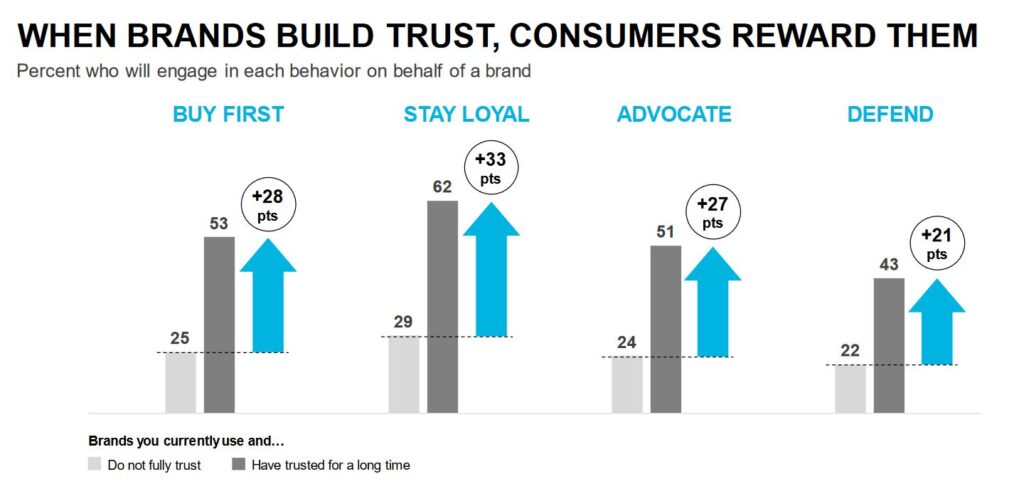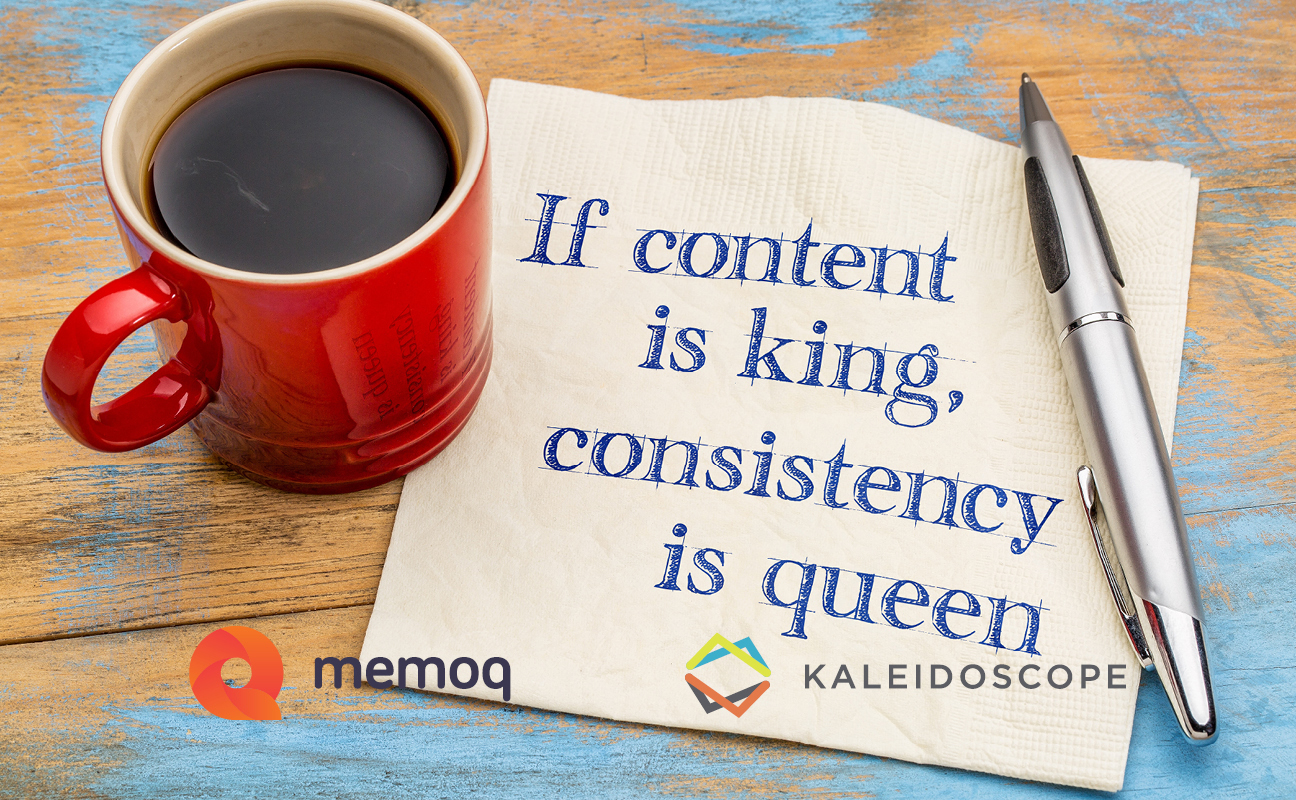"Content is king" – who would disagree with Bill Gates on this statement. Now, content marketing is getting its next boost. Privacy laws are restricting the use of cookies and thus forcing companies to invest even more in content. In this blog post, we will show how you can turn a necessity into a clear benefit with consistent content in all of your target market languages.
In the following, we will show
1) Why content marketing is so important
"Content marketing is important, not just because it works for building trust, generating leads, and cultivating customer loyalty, but because it has become the new normal from the consumer side."
This quote by Michael Brenner is a great summary of what content marketing can do for you and your organization. But let us look at it a little bit more closely:
1a) Content marketing builds trust

This infographic from Edelman says more than a thousand words: The link between trust and buying behavior is crystal clear: it is your content that establishes and builds a relationship with your audience. Here it is important to offer valuable content without asking for anything in return and refrain from boastful self-praise.
1b) Content marketing boosts customer loyalty
Trust is also a key to keeping your customers. In the Edelman Special Report 2019 mentioned above, more than two out of three respondents agree with the statement: "A good reputation may get me to try a product, but unless I come to trust the company behind the product, I will soon stop buying it."
1c) Content marketing generates leads
Demand Metric found out that content marketing generates over three times as many leads as outbound marketing and costs 62% less. Considering that more than 8 out of 10 people skip TV ads, more than 90% unsubscribe from company e-mails and almost 50% ignore direct mail, this comes as no surprise. Content marketing, however, works like a charm: 6 in 10 people are not only inspired to search for a product after having read the content but enjoy reading relevant content from the brand.
1d) Content marketing makes your brand successful
There are of course many more benefits that you gain from pursuing content marketing. If you want to drill deeper into this subject, you can find more material from bodies such as the Content Marketing Institute.
2) Why consistency is crucial for content marketing
After these arguments, you will almost certainly agree that content marketing is important for your company. Now the question is, how do you make your content successful? As there are already plenty of marketing recipes out there, we will tackle that question from a language perspective.
So, just imagine that a prospect is interested in a certain product of your company. During their research, the prospect downloads different brochures, reads a blog post on this product, and even scrutinizes the product documentation. Unfortunately, different expressions for the same thing pop up in the various documents – which leave the prospect confused and probably reluctant to buy your product. This lack of language consistency is endangering the hard work you are putting into your content!
"Many factors contribute to a brand's success, but perhaps one of the most valuable is content consistency. From social media and blogging to responding to customer reviews and replying to emails, your content needs to maintain a consistent voice, tone and style."
So how can you ensure that all customer touchpoints with your company are consistent? This may come as a surprise to some, but to others, it is clear that implementing and managing enterprise-wide terminology is the key to this much-needed consistency.
2a) Making use of terminology
A survey by tekom, the German Association for Technical Communication, delivered some interesting facts that underline the importance of terminology for consistent content:
- Almost 90% of the survey participants experience that different company divisions or even employees use different expressions for the same thing.
- Almost 3 out of 4 respondents notice that different designations are used for the same thing in different documents.
If we look at these findings from a positive point of view, it quickly becomes clear that terminology helps writers in all your departments to select the right terms for any concept and will make the content easy to find. As a logical consequence, the accuracy and clarity of your messages and thus your branding get a powerful boost.
Terminology management should therefore come before the creation of any kind of content. Realistically, this will not be the case, at least not all the time. Nevertheless, the terminology should always be up-to-date and usable for everybody in the entire organization. This is especially true for the translation (department).
3) The significance of localized content
"Based on a survey of 8,709 global consumers in 29 countries in Europe, Asia, North America, and South America, CSA Research found that 76 percent of online shoppers prefer to buy products with information in their native language. Forty percent state that they will never buy from websites in other languages."
These findings from CSA Research, a leading market research institute in the field of translation, simply leave no choice: to be internationally successful, you have to translate your content. Whether you do that with your own translators or with the support of language service providers (LSPs) or with a combination of both in-house and external translation forces depends on your overall strategy. There is, however, one thing they will need in order to deliver consistent quality content in all target languages: a translation management system (TMS). For example, the memoQ TMS is well-suited to helping companies manage their localization work and optimize processes.
With a translation management system, your translators will save time – and you will save money, thanks to its inherent translation technology. For example, the so-called "Translation Memory" is your special database with all your original texts and their corresponding translations (you can think of it as like a dictionary, but for entire sentences). While the texts are being translated, the translation memory checks for identical or similar texts that have already been translated and informs the translator at once if a "match" is found. This means your translator can translate faster and more consistently.
4. How everything sums up nicely
In the pursuit of consistent global content, you obviously need to combine terminology and translation in the next step. Thankfully, translation management systems like memoQ TMS have terminology capabilities and are usually connected with terminology management systems.
Get to know more about this topic here.
4a) The memoQ-Kalcium Quickterm integration
A great way to support your consistency efforts is by using the memoQ-Kalcium Quickterm integration which is based on API technology. This integration makes terminology available to both translators as well as the authors creating the source texts. And both can request words the addition of new terms or concepts as needed, which are then managed within the customizable Kalcium Quickterm workflow.
In other words, with Kalcium Quickterm, you can establish processes and define your terminology collaboratively, and thus ensure a consistent voice across all your translations and texts at an enterprise management level.
4b) Your building block for successful content marketing

Content marketing is important if you want to be successful. To be able to build on content marketing, it is essential that terminology be viewed as the key to consistency and translation as the key to international markets.
If you have any questions or are already interested in building on an integrated translation and terminology workflow, please contact us via the button below.



